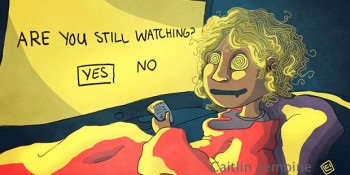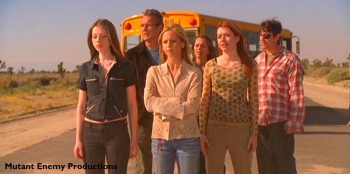Several months ago, I touched on how the way we view television is changing. We are no longer tied to network schedules, and the combination of DVR and online streaming has turned “binge watching” into a full-fledged revolution in media consumption.
Suddenly realize there’s a show you want to start watching, but it’s about to start its fourth season? No problem; chances are you can find every episode of that series somewhere online and catch up before the new season starts. I’ve done that for many shows in the last few years.
But binge watching doesn’t just change the way you consume a certain television series: it creates a whole new experience while you’re watching it. When you watch several installments back to back, you remember all the little details you may have forgotten from one episode to the next if you had waited a full week between them. Binge watching that show then becomes more like reading a book; you can always go on to the next chapter whenever you want.
I’m a big book nerd. I’ll read just about anything I can get my hands on, and I can’t walk out of a bookstore without buying something — even though I already have well over 100 books in my “to-read” pile. With books, I really love the stories and the way they immerse you in another place or time. Binge watching television can have the same effect in a different medium. Settling in on the couch to watch a good series isn’t much different than curling up with a good novel.
When I read a book — especially vividly written fiction — my imagination runs wild. The world of the book becomes real to me. Certain books have more of an effect than others, but each has some sort of impact. The same goes for a really well-written television show. The more you watch, the more it gets in your head, and the characters, along with the world they inhabit, start to feel more and more real.
Maybe it’s just me, but I’ve found that many of the shows I’ve binge watched are the ones I’ve become more invested in. We formed a bond during those 12 hours spent watching episode after episode. (OK, so 12 hours of television in one sitting is a slight exaggeration, but you get the picture.) In some ways, watching shows like this can almost become an addiction: you plan your day so that you have enough time to squeeze in at least a couple more episodes — because you can’t not watch.
Then, once you’ve finished the series (or all the episodes you have access to), part of you just wants to go back and start them all over, like you do when you finish reading a really good novel. You aren’t ready for it to be over, but there isn’t anything else left, so you might as well start again from the beginning. This happened when I binge watched Doctor Who and Torchwood for the first time years ago, and when I watched the first two seasons of Teen Wolf last summer.
Some people try to tell me rereading books is a waste of time, and the same could go for rewatching television shows. There are so many other options out there, they say, why bother with something you’ve already seen (or read)? I disagree.
I often equate rereading a book with a visit to an old friend. You get to relive all the things you loved, remember all the things you forgot, and sometimes learn things you hadn’t known before. I’m currently in the middle of rereading all the Harry Potter books and am enjoying them just as much as I did the first time around. The same is true when you binge-watch a series you’ve already seen from start to finish. You’re reminded of all the qualities you enjoyed about the series the first time, and you get to experience all your favorite parts over again.
My family and I have been rewatching Gilmore Girls recently, and there are so many things that we had forgotten about the series that some episodes feel like we’re watching them for the first time. And there’s something comforting about revisiting Rory and Lorelai’s adventures. I’ve always wished I could live somewhere like Stars Hollow (though if I actually did, I’d probably go crazy in a week), and I love visiting that town through the show.
There are those who would argue that watching television is not as intellectually stimulating as reading a book in your down time, but those people apparently haven’t tried figuring out what Hurley’s lottery numbers mean on Lost or put thought into any number of other television mysteries.
One way in which binge watching a series could arguable be superior to reading a novel is with those frustrating cliffhangers. The ability to binge watch a show that has a habit of ending in cliffhangers, either at the end of an episode or at the end of a season, means you don’t always have to wait a week (or several months) in between those episodes to see what happens next. Unfortunately, in a series of novels, there’s no way to avoid the big cliffhangers between books unless you wait until the entire series is published before reading.
When each Harry Potter book came out, I started reading and did not stop until the book was finished. I read all 759 pages of Harry Potter and the Deathly Hallows in less than 12 hours. That’s not much different than watching an entire season of television in less than a week. Book readers have been in on this trend for decades; now, binge watching is the new normal for television.
If you’re looking for suggestions on what shows to binge watch, check out our Binge Watch column where we periodically review shows our staff writers have binged.

